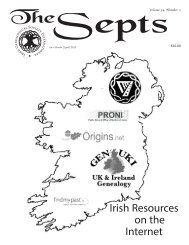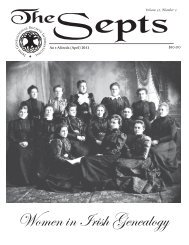(April) 2011 - Irish Genealogical Website International
(April) 2011 - Irish Genealogical Website International
(April) 2011 - Irish Genealogical Website International
Create successful ePaper yourself
Turn your PDF publications into a flip-book with our unique Google optimized e-Paper software.
_______________________________________________________________________ Editor’s Letter<br />
Women Who Dared to Dream<br />
by Ann Eccles<br />
Bernadette Devlin, a 20th century <strong>Irish</strong><br />
politician, stated in 1969, “Yesterday<br />
I dared to struggle. Today I dare to win.”<br />
These words symbolize the efforts of <strong>Irish</strong><br />
women throughout the ages – their struggles<br />
to win the battle and to provide better lives<br />
for themselves and their families.<br />
This is a story that we as family historians<br />
have seen repeatedly in our research. The<br />
ancestors who left Ireland to improve<br />
their lot in life – and to help the family<br />
members left behind in Ireland. The new<br />
immigrants who worked in mills or farmed<br />
land to provide the necessities of life. But<br />
it was the women who found ways to do a<br />
bit more with whatever was at hand: they<br />
sold the extra eggs and garden vegetables;<br />
they took in laundry, did hand-sewing or<br />
dress-making. Their vision was of a better<br />
life and a better home for the family, a better<br />
education for their children.<br />
My great-grandmother, Mary Wheeler, was<br />
born in the U.S. of <strong>Irish</strong> parents in 1864.<br />
I believe that she worked to improve the<br />
lives of her children as my grandmother<br />
Jennie excelled in the traditional women’s<br />
skills. She was her own seamstress and<br />
created many fine outfits for me and my<br />
young cousins, once even producing a<br />
crocheted jacket. She excelled in all areas<br />
of needlework – knitting, crocheting and<br />
tatting. I still have the bedspread she made<br />
and used throughout her marriage.<br />
Jennie strongly believed in bettering oneself<br />
through education and more. She supported<br />
Catholic school educations for all of her<br />
grandchildren. Family lore says that she<br />
supported the suffragette cause at the turn of<br />
the century to improve the status of women<br />
– though I have no photos or other evidence<br />
of such. And another story says that it was<br />
she who taught my father to drive on the<br />
steep hills of New Bedford, Mass., though<br />
<strong>Irish</strong> <strong>Genealogical</strong> Society <strong>International</strong><br />
she did not have a car or driver’s license<br />
twenty years later.<br />
Jennie died more than fifty years ago. While<br />
I remember a sweet and loving grandmother,<br />
what I am learning about her indicates more<br />
complexity to her life and character – a core<br />
of strong values, faith and determination<br />
that she worked to pass along to the next<br />
generations.<br />
Some of the articles in this issue will<br />
illuminate the character of <strong>Irish</strong> women.<br />
Colleen McClain’s article illustrates the<br />
strength of mind, body, and soul of <strong>Irish</strong><br />
women historically. The <strong>Irish</strong> Catholic<br />
nuns who taught faith to young men and<br />
women or the housemaids who cleaned the<br />
homes of the American wealthy: the goals<br />
of both were an improvement of life for<br />
<strong>Irish</strong> Americans. Maureen Reed describes<br />
the lives of two sisters who left Ireland and<br />
arrived in the American Midwest in the<br />
mid-1800s. She shares the details of her<br />
research, tracing the women from St. Louis,<br />
Missouri, back to Ireland and forward to<br />
the farmlands of Minnesota.<br />
Two authors share widely different views<br />
of <strong>Irish</strong> women in the 18th century. Harold<br />
Hinds examines the marriage options of<br />
aristocratic <strong>Irish</strong> men and upper-class <strong>Irish</strong><br />
women in his commentary on In Pursuit of<br />
the Heiress. Linda Miller shares a bit of the<br />
history related to <strong>Irish</strong> convicts (women<br />
as well as men) who were transported to<br />
Australia as punishment for their crimes.<br />
She lists a few websites for further research.<br />
Mary Wickersham looks at <strong>Irish</strong> cultural<br />
sites for some fun and informational<br />
surfing.<br />
But just how do you find information on<br />
female ancestors? Tom Rice’s article provides<br />
a series of questions and genealogical<br />
strategies to get you started in researching<br />
the lost or forgotten women in your lineage.<br />
Jay Fonkert offers interesting examples of<br />
finding women’s maiden names through<br />
census records, for the women generally<br />
keep the connections with other family.<br />
Judith Eccles Wight discusses the local<br />
resources on County Tipperary. David<br />
Rencher returns with the third installment<br />
on the Betham collection, covering the<br />
material deposited in the <strong>Genealogical</strong><br />
Office in Dublin. Dwight Radford<br />
looks at the Plymouth Brethren records.<br />
Members of the Christian Brethren, a nondenominational<br />
movement that started<br />
in the 1800s, are particularly difficult to<br />
identify in genealogy records. He compiled<br />
a large inventory of Brethren assemblies<br />
– too large to accompany the article in The<br />
Septs – that has been placed on the IGSI<br />
website.<br />
Every so often the editors step back to look at<br />
the journal – the layout, contents, etc. – and<br />
to consider changes. With this issue a few<br />
elements of the journal changed. You may<br />
have noticed a new look to some of the pages<br />
in this issue of The Septs. Let us know your<br />
reactions: are there other improvements to<br />
consider, do you miss something. Just send<br />
an email to Septseditor@<strong>Irish</strong><strong>Genealogical</strong>.<br />
org.<br />
Enjoy this issue. Happy Reading!<br />
Ann Eccles delved into genealogy after she<br />
retired. Finding almost every branch leading<br />
back to Ireland, she<br />
continues to explore<br />
her many <strong>Irish</strong> lines.<br />
Ann serves as president<br />
of the Board of<br />
Directors, assists in<br />
the library and with<br />
other tasks. She has<br />
been a member of<br />
IGSI since 2003.<br />
Page 69




